What is a primary election?
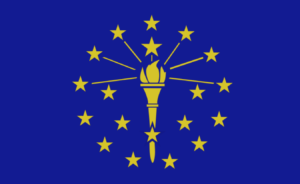
Primary elections in Indiana are on May 7, with early voting beginning on April 9 in Monroe County.
In the primary election, candidates in one party will run against candidates in the same party to determine who will run in the general election next fall against a candidate from the other party. Each state chooses when to hold its primary election, and this year in Indiana it is on Tuesday, May 7, with some opportunities to vote early. The general election will be held on November 5 in every state.
Due to Indiana’s highly gerrymandered election districts, primary election voters might actually choose the eventual winner of the general election, because in some districts one party’s registered voters greatly outnumber the other’s.
Primary election on May 7, 2024
Under Indiana law, to vote in the primaries, eligible voters are required not only to register to vote (see below for details) but also to declare a party affiliation to either the Republican or Democratic party. Primary voters will see only the candidates in their chosen party on their ballot. You can view sample ballots on the Monroe County government website at co.monroe.in.us.
This year, besides the primary elections for U.S. President, U.S. Senate, and U.S. House of Representatives, elections in Monroe County will be held for the following positions:
 State Senator for District 40
State Senator for District 40- State Representative for District 61
- State Representative for District 62
- Monroe County Commissioner for District 2
- Monroe County Commissioner for District 3
- Monroe County Council–At Large
- Monroe County Auditor
- Monroe County Treasurer
- Monroe County Coroner
- Monroe County Surveyor
Also up for election or reelection are three circuit court judges and at-large convention delegates for each party. Several of the positions are uncontested in the primaries, meaning no other candidate in the same party is running for that seat.
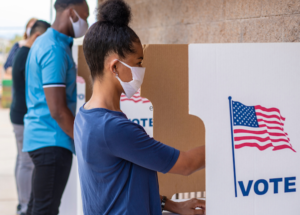
Indiana primary voters must declare either a Republican or Democratic party affiliation.
Register to vote
In Indiana, you must register to vote at least 30 days before primary election day and must fit these requirements:
- Be a citizen of the United States
- Have a valid Indiana driver’s license or Indiana state identification card
- Be at least 18 years old on or before the next general, municipal, or special election
- Have lived in your precinct for at least 30 days before the next general election
- Not be imprisoned after being convicted of a crime.
You can register in person at Election Central in Bloomington, 401 W. 7th St., Monday to Friday, 8 a.m. to 4 p.m. Because Election Central will be closed on Monday, April 8, due to the eclipse, the deadline to register in person has been extended to noon on Tuesday, April 9. If you register online at indianavoters.in.gov, however, the deadline is 11:59 p.m. on Monday, April 8. Anyone who has an Indiana driver’s license or Indiana state identification card can also register online. Voters can check their registration status at that site, too, as well as find polling places and apply for Vote by Mail.
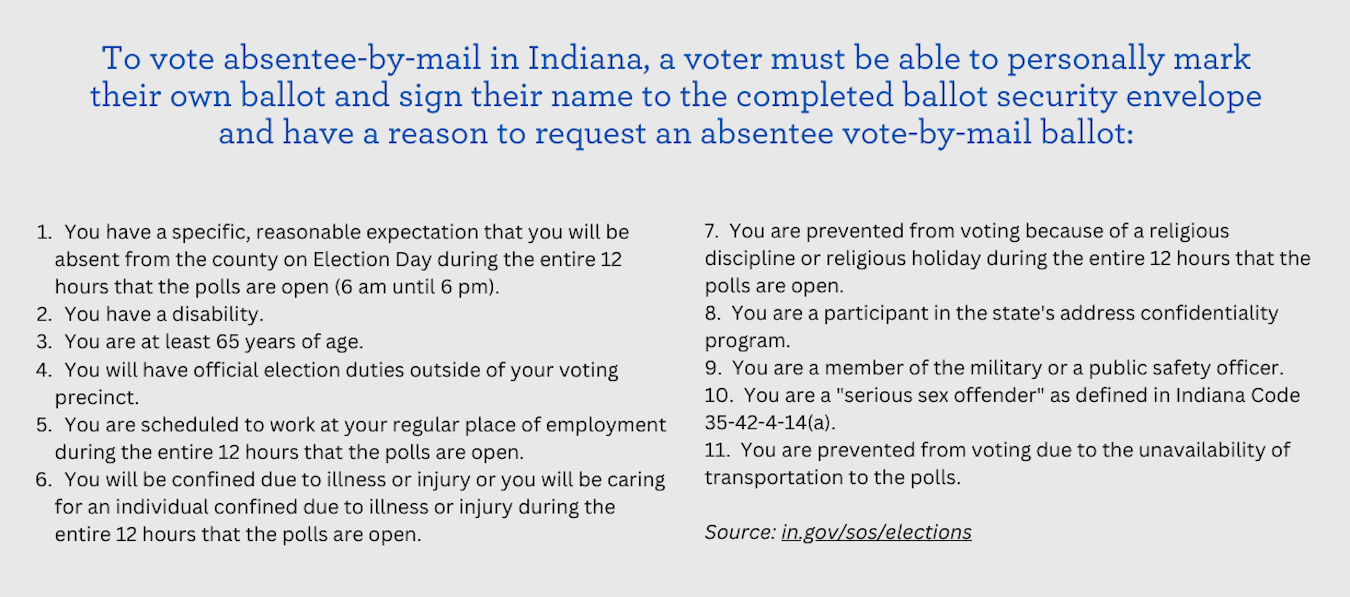
ID required
If you vote in person (early or on election day at the polls), you will need a photo ID issued by the U.S. or Indiana government with these requirements:
- Your name; the name on the ID must “conform” to the name on the registration; the two may vary in fullness of the name, use of initials, etc., but should be recognizably the same
- Your photograph
- An expiration date that is after the date of the last general election
The Indiana Secretary of State’s website has more info on the photo ID law, including exemptions.
How to vote

Early voting in Monroe County is at Election Operations, 302 S. Walnut St., beginning April 9. | Limestone Post
“Absentee in-person” voting, also called early in-person voting, is available for four weeks (28 days) before the elections. In Monroe County, you can vote early at Election Operations, which is in the former NAPA building at 302 S. Walnut St. in Bloomington, at the southwest corner of 3rd and South Walnut streets.
Beginning on Tuesday, April 9, Election Operations will be open for early in-person voting on weekdays, 8 a.m. to 6 p.m., and on two Saturdays — April 27 and May 4 — from 9 a.m. to 4 p.m. The last chance for early voting is on Monday, May 6, from 8 a.m. till noon.
Absentee voting by mail is available only for voters with one of the state’s eleven reasons, which include having a disability, being at least 65 years of age, being absent from the county on Election Day, and being scheduled to work at your regular place of employment during the entire twelve hours that the polls are open. Applications for absentee ballots are due by April 25. Download an application here or apply online at indianavoters.in.gov/MVPHome/PrintDocuments.
To vote on primary election day, Tuesday, May 7, take your government-issued photo ID to your local polling place between 6 a.m. and 6 p.m. Find your polling place at indianavoters.in.gov.
Get informed
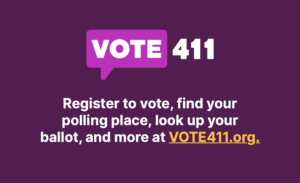
Vote411.org has voter information by state.
Make the most of your vote — learn about the candidates and issues on the ballot. The League of Women Voters of Bloomington–Monroe County has an online voter guide at Vote411.org where all registered candidates for an office are invited to respond to the same set of questions. (See below for responses from candidates for Indiana House of Representatives District 62, Indiana Senate, and Indiana Governor.) Vote411 has more information on local, state, and national elections.
Several community organizations plan to offer forums where candidates will respond to audience questions. You can watch many of these afterward on Community Access Television Services (CATS).
The League of Women Voters is holding a forum on April 6 on Zoom (register here).
Black Lives Matter B-Town has released its 2024 Voter’s Guide, which assesses candidates based on a grading rubric. The guide includes both an “At the Polls” Short Form and more in-depth Long Form.
The Indiana Citizen has ongoing election coverage and several voter resources, such as a guide to the candidates and a “Virtual Ballot” where you can enter an address and see the local candidates.
Indiana Capital Chronicle has conducted Q&As with the Republican candidates for governor. The topics are taxes, education, the economy, and the environment.
Chalkbeat Indiana has posted a guide to the 3 school operating referendums on the ballot this May, including one in Brown County, “with the bulk of the funding earmarked for salaries, benefits, and programs.”
The Greater Bloomington Chamber of Commerce is holding its Elect Connect event on April 16 at Upland Brewing Co.’s The Woodshop, 350 W. 11th Street. The Chamber has invited candidates for county councilor and county commissioner. Topics can include affordable housing, infrastructure and roads, zoning, and business development.
Limestone Post will add resources to this page as they become available. If you would like for us to include specific information about voting and elections, please let us know at [email protected].
Candidate Comments
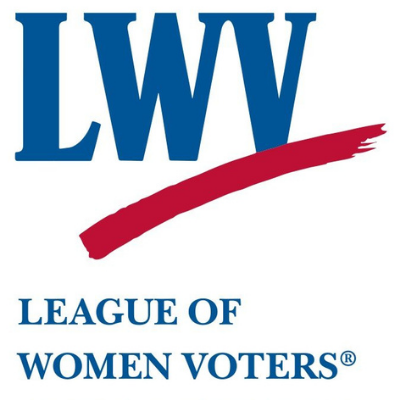 Compiled by the League of Women Voters of Bloomington–Monroe County
Compiled by the League of Women Voters of Bloomington–Monroe County
Indiana House of Representatives District 62
Indiana House of Representatives District 62 is a gerrymandered district that covers much of Monroe County, including parts of Bloomington, as well as parts of Brown and Jackson counties. The 2022 race for District 62 was decided by just 74 votes.
The League of Women Voters of Bloomington-Monroe County asked candidates for House District 62 — incumbent Dave Hall, the Republican party candidate, and Thomas Horrocks, the Democratic party candidate — the following questions. Dave Hall has not responded.
What policies and plans do you have to address the challenges of pollution as it affects community health, the climate, and the environment?
Thomas Horrocks: U.S. News and World Report has ranked Indiana 50th in “Natural Environment.” Our waterways are the most polluted in the country and our air is the third most polluted. For those reasons, I would support a State Environmental Action Plan that seeks to reduce pollution across all sectors. That plan should include increased state funding for conservation, mitigation, and restoration. It should also include both incentives for promoting environmentally friendly policies and practices as well as penalties for polluters. That plan should also require an environmental impact report on all proposed legislation and, ideally, major developments.
Should all schools that receive state funds be held to the same standards of fiscal transparency, academic standards, and accommodations that public schools are subject to? Please explain your answer.
Horrocks: Funding for public education is a direct investment in our future and, as such, should be a top priority for our state. In order to ensure fiscally and socially responsible investment, any school that receives public education dollars should be subject to the same standards and accountability as traditional public schools. Schools that wish to be exempt from those requirements should not receive state money.
What are your priorities on reproductive health and access to obstetric health care?
Horrocks: As of 2022, Indiana had the third highest maternal mortality rate and the seventh highest infant mortality rate in the country. Furthermore, 25 percent of Indiana’s counties are maternity care deserts, and this is likely to get worse as OB-GYNs flee the state in response to the legislature’s drastic overreach. It is imperative that we prioritize the full spectrum of reproductive health by both rolling back the state’s abortion bans and working to increase the accessibility and affordability of obstetric health care across the state.
What actions, if any, would you take to address the need for affordable housing?
Horrocks: I would support measures that incentivize both county- and municipal-level governments to invest in and promote mixed-income housing developments. I would also support subsidies for new housing developments to help offset the costs of infrastructure, so long as those cost savings are passed on to the buyers and/or renters in order to lower the barrier to entry. Finally, I would support measures that enforce habitability standards and protect the rights of low-income tenants.
What policies on gun safety do you support?
Horrocks: I support universal background checks on all firearm purchases without loopholes, restrictions for people with dangerous histories and other red flag laws, secure storage regulations, and an end to gun-maker immunity.
Indiana U.S. Senator
Description: The United States Senate is the upper house of the United States Congress. It consists of 100 members. Each state has two senators, and they are elected directly by the people.
The term of a senator is six years, and the terms are staggered so that approximately one-third of the seats are up for election every two years. The staggering of the terms is arranged to ensure that both seats from a given state are never contested in the same general election except when a mid-term vacancy is being filled.
The U. S. Constitution sets three qualifications for senators: Each senator must (1) be at least 30 years old, (2) have been a citizen of the United States for at least the past nine years, and (3) be an inhabitant (at the time of election) of the state they seek to represent.
Powers reserved to the Senate include:
- Confirming or rejecting treaties;
- Confirming or rejecting presidential appointments to office, including the Cabinet, other officials of the executive branch, federal judges, including Supreme Court justices, and ambassadors; and
- Trying a government official who commits a crime against the United States.
The Senate uses committees for a variety of purposes, including the review of bills and the oversight of the executive branch. The appointment of committee members is formally made by the whole Senate, but the choice of members is made by the political parties. Each Senate committee and subcommittee is led by a chairperson, usually a member of the majority party.
The House and Senate are known collectively as the Congress. Among other powers, Congress can declare war, regulate interstate and foreign commerce, and control taxing and spending policies.
The job of a senator is to act on behalf of the American people in legislative sessions to ensure the voice of the common citizen is heard.
Term: 6 years
Candidates
Jim Banks, Republican
The candidate has not yet responded.
Marc Carmichael, Democrat
Campaign Website: marcforindiana.com
Leadership Experience: Indiana State Representative 1986-1991; Director of Governmental Affairs, Indiana Gas Company 1991-1999; President, Indiana Beverage Alliance, 1999-2020.
Education: BA University of Notre Dame 1972
Valerie McCray, Democrat
Campaign Website: valeriemccray.org
Leadership Experience: Valerie McCray, PH.D. is a Clinical Psychologist practicing in the State of Indiana. While navigating the challenges of being a single mother of one son, Ryan, she earned BA, MA, and PH.D. from the University of Michigan. Dr. McCray accepts every opportunity to serve our men and women of the military. She has evaluated thousands of men and women of the military suffering from Post-Traumatic Stress Disorder and Traumatic Brain injuries from wars in Iraq, Afghanistan, the Gulf War, and Vietnam.
Campaign Video: vimeo.com/923423800/8d28b94698
Question #1. Identify a top domestic challenge in the United States. How would you address it?
Carmichael: The striking down of Roe v. Wade by the Republican majority of the Supreme Court. Codify Roe v. Wade at the federal level.
McCray: Equitable, quality health care SHOULD BE a fundamental right for all people; not a privilege for the wealthy few. Millions of Americans are one bad diagnosis away from going broke. It’s time for a system that is focused on patients, not profits. In Congress, I will be committed to finding constructive ways to improve our nation’s health care system, expand access to quality and affordable health care, and reduce costs for middle-class families no matter their income, race, gender, zip code, or medical diagnosis. I will make it a priority to end abusive pricing practices by the pharmaceutical industry and give patients a break at the pharmacy counter. I will support increases for health and science research to invest in tomorrow’s cures.
Q2. Identify a top foreign challenge for the United States. What suggestions do you have to respond to it?
Carmichael: Protect and expand democracies. Fully fund the Ukraine war effort and fully support NATO.
McCray: Our values at the national level are inconsistent. On one hand, we support Ukraine’s sovereignty and independence against Russia; but on the other hand, we enable the death and destruction of Palestinian people and the constant encroachment of their land. We’re losing the respect of the global community because of this hypocrisy. We can’t pick and choose when and if to impart our values. Our solution is to implement policy and foreign relations that value ALL human life — applied equally. I understand that because of historical trauma, there is a need for safety of Jewish people — it shouldn’t be at the expense and security of the Palestinians. An immediate ceasefire and a return to a commitment for a two-state solution is a must.
Q3. What reforms would you recommend for improving the management of immigrant and refugees on our southern border?
Carmichael: Adequate foreign aid to the countries from which the refugees are fleeing, enhanced border security with more border guards, adequate shelter for refugees seeking asylum, more judges and courts to address the legal backlog.
McCray: First, we need to get the facts straight. We must stop using immigration as a scapegoat for America’s problems — this fear mongering is subjecting immigrants to exploitation, trafficking, neglect, & cruelty. When I’m in office, I will focus on comprehensive immigration reform legislation through bipartisan efforts without watering down democratic values. I will push for expedited work permits for those already here; fairer/more efficient process for asylum claims, & immigrant visas for families/workers. We aren’t here to dehumanize and tear apart families. I will push for increased funding for immigration judges, asylum officers, border patrol agents, and equipment. President must have the ability to shut down the border when/if overwhelmed.
Q4. Do you support or oppose current Indiana laws on abortion? Comment on your response.
Carmichael: Oppose. Indiana’s abortion laws are narrow minded, mean spirited, and unconstitutional. Women in Indiana are second class citizens. Indiana, as well as all the other states, should have uniform abortion laws that are no less than those set out in Roe v. Wade.
McCray: The right of a woman to make autonomous decisions about her own body/reproductive functions is at the core of her basic human rights to equality, medical privacy, & bodily integrity. I will push for legislation that protects access nationally to abortion with FDA-approved medication/procedures & defend access to emergency medical care & everyday reproductive care. Affordable contraception to anyone who wants and needs it. Safeguard the privacy of patients/providers & ensure they have accurate information and legal resources necessary. For those choosing to grow their family, ensure they have adequate access to resources and for pay for quality of life. In the meantime, I will push for ability to safely travel from banned states.
Q5. As a potential member of Congress, are you willing to support bipartisan legislation for the benefit of Hoosiers and the country?
Carmichael: Of course. I will put country before party at every turn. If I am elected to the U.S. Senate I would look forward to cooperating with Sen. Todd Young to get things done for Indiana and the United States in a bipartisan manner. I am a legislator, not a bomb thrower.
McCray: As Senator, I will meet/confer with my colleagues on all sides of the political spectrum. Although we’re more polarized than ever, it’s still possible to have productive conversations about political beliefs. If we focus on PEOPLE over politics, we are closer to finding common ground. If we stick the facts/avoid confrontation (if possible), we can be an advocate, rather than an opponent. With that said, I will not water down or forsaken MY democratic values. Ultimately, human rights are nonnegotiable. The decision of whether marginalized groups should receive assistance, support, or advocacy should not be based on which party happens to be in power at the time. Politicians should uphold rights of all people, not just a few.
Indiana Governor
Description: The Governor of Indiana is the head of government and head of state of the state of Indiana. The governor is elected to a four-year term and responsible for overseeing the day-to-day management of the functions of many agencies of the Indiana state government. The governor also shares power with other statewide executive officers, who manage other state government agencies.
Powers and responsibilities include:
- Veto legislation passed by the Indiana General Assembly. If vetoed, a bill is returned to the General Assembly for reconsideration.
- Call out the Indiana Guard Reserve (the state defense force) or the Indiana National Guard in times of emergency or disaster.
- Enforcement of all of the state’s laws and the Indiana Code through the Indiana State Police.
- Ability to grant a pardon or commutation of sentence of any person convicted of a crime in the state, except in cases of treason or impeachment.
- Appointment of judges.
Term: 4 years, limited to two terms
Candidates
Mike Braun, Republican
The candidate has not yet responded.
Brad Chambers, Republican
The candidate has not yet responded.
Suzanne Crouch, Republican
The candidate has not yet responded.
Eric Doden, Republican
Campaign Website: dodenforindiana.com
X (Twitter): twitter.com/DodenForIndiana
Leadership Experience: Founder, PAGO Development. Past President, Greater Fort Wayne, Inc. Past President, Indiana Economic Development Corporation.
Campaign Video: youtube.com/watch?v=Q0BSl1TWnL4
Curtis Hill, Republican
Campaign Website: Curtishill.com
Jennifer McCormick, Democrat
Campaign Website: McCormickforGov.com
X (Twitter): twitter.com/McCormickforGov
Leadership Experience: Jennifer McCormick is a lifelong educator and multi-generational Hoosier from New Castle, Indiana. She has spent decades serving Indiana as a teacher, principal, and most recently, state superintendent of public instruction. While superintendent in rural Indiana, Jennifer fought to protect local control of school districts to ensure parents, teachers and administrators could make the best decisions for their children. As state superintendent, she was a powerful advocate for teachers and students, ensuring they had the resources they needed to succeed while also protecting the taxpayer dollar by demanding transparency and fiscal accountability.
Campaign Video: youtube.com/watch?v=SkEJzSRpMM4
Jamie Reitenour, Republican
The candidate has not yet responded.
Question #1. What would be your number one priority as governor, and what steps would you take to achieve it?
Doden: As governor, my highest priority is to fight for the rural Hoosier communities politicians have ignored. We can’t be a state where only three or four counties are thriving, we must be a state where all 92 counties are thriving. My Indiana Main Street Initiative gives Indiana an economic development plan and playbook for the 2.7 million Hoosiers who live in small towns. We will reclaim our historic downtowns, restore community pride, enhance small business formation, and stimulate economic and population growth for small-town Indiana. I am dedicated to governing by the small town values that career politicians have failed to remember, and I pledge to be a conservative champion for small towns across the state.
Hill: My number one priority is ending the Office of Diversity, Equity, and Inclusion. I will use an executive order on day one to end this and restore fairness to all institutions. We must reward excellence and pick the best person for every role. I will not play into identity politics.
McCormick: As governor, my priority would be to ensure the well-being and prosperity of every Hoosier by prioritizing their health and education. This commitment involves championing the restoration of reproductive rights and freedoms, ensuring individuals have autonomy over their bodies and health care decisions. Additionally, I would advocate for robust and equitable funding for education, encompassing comprehensive programs from birth through pre-K to post-high school and workforce training initiatives. By investing in both health and education, we not only empower individuals to lead healthier and more fulfilling lives but also cultivate a stronger, more resilient community poised for future success which builds a stronger economy for Indiana.
Q2. What suggestions do you have for changes in Indiana tax law?
Doden: Indiana tax law provides a great opportunity to work with the legislative body and create change Hoosiers can feel in their pocketbooks. The American Dream seems out of reach for many Hoosiers as they struggle to pay for everyday expenses and high property taxes. I plan to work closely with the legislature to build a statewide plan that brings down these high tax rates and caps property taxes for seniors. I support a tiered approach to property taxes that allows Hoosiers who are over 65 to receive relief and stay in their homes by capping the amount their property taxes can increase each year. As governor, I will not leave Hoosiers with promises that can’t be kept, but commit instead to working with the General Assembly to lower taxes.
Hill: We must return the gas tax to pre-2018 levels. Big government Republicans pushed this through and it hurts the average Hoosier. Reducing this tax would also help farmers who have to operate heavy machinery on a regular basis. This is a sensible and achievable goal, not a gimmick.
McCormick: Prioritize inclusive decision-making through a comprehensive study committee, ensuring input from diverse stakeholders and fostering transparency and accountability. This study would include examining tax incentives for new businesses and industries. I would halt the increase of gas taxes, as burdensome taxes disproportionately affect low-income individuals and hinder economic growth. Revise current revenue allocations to alleviate property tax increases that fall outside the cap, providing relief to homeowners. By revisiting income tax structures to identify opportunities for reduction, we can ease the tax burden on working families and encourage economic activity, growth, and development for all Hoosiers.
Q3. What measures will you take to improve the management of Medicaid and Medicare funding to ensure adequate health care coverage for these recipients?
Doden: First, we need to avoid errors like the billion-dollar budget projection deficit revealed last legislative session. That starts with leadership in the governor’s office and in our state agencies. I’m the only candidate in this race on the record saying each agency head will be required to reapply for their job. For Indiana’s Medicaid and Medicare programs specifically, management of these programs is a vital part of the state’s overall budget along with education, transportation, infrastructure, and public safety. That means working with the General Assembly to live within our means and bring these programs out of their projected deficits, making sure able-bodied people are working, and preserving access for the most vulnerable Hoosiers.
Hill: I will always protect seniors and low-income Hoosiers. Funding health care is important, including attracting qualified medical professionals to Indiana to provide world class care. My economic plan addresses this through targeted tax breaks.
McCormick: Our Medicaid and Medicare oversight in Indiana has become untenable, exacerbated by the burden of COVID-19 on our community starting in early 2020. Our fellow Hoosiers who depend on these resources deserve better. To enhance Medicaid and Medicare management, I will conduct a thorough audit of the current revenue and expenditure flow, ensuring transparency and accountability. Collaborating with affected families and organizations, I’ll ascertain the optimal timing and necessity of fund distribution, prioritizing equitable health care coverage. Additionally, implementing a robust oversight system across state agencies will guarantee responsible fund utilization, safeguarding resources for comprehensive and sustainable health care access.
Q4. Do you support or oppose current Indiana laws on abortion? Comment on your response.
Doden: As a husband, father, and faithful Christian, I am 100% pro-life. For me, being pro-life is a human rights issue: it means being pro-mother, pro-child, and pro-family. In the office of governor, I will be a champion for life by supporting legislation and policies that protect unborn children and mothers. Our Zero-Cost Adoption Plan will lead the way in ensuring mothers who choose life and families who choose adoptions receive the support they need to provide safe and loving homes for Hoosier children. Together, we can build a culture of life in Indiana by protecting the vulnerable and making Indiana one of the first states in the nation to provide zero-cost adoption.
Hill: I support the current law but believe it needs to be properly enforced. We must demand Terminated Pregnancy Reports (TPRs) from the Indiana Department of Health so that only those with truly extraordinary circumstances are using these exceptions. I believe in a culture of life and will fight for it.
McCormick: I strongly oppose Indiana’s current laws on abortion. Indiana’s Republican-led extreme abortion ban has taken away the right of women to make deeply personal decisions regarding their own health care. Government action should not compromise the health of its citizens or severely limit opportunities to reach their full potential. The abortion ban disregards the health and well-being of Hoosier women. Indiana’s maternal mortality rate is the third highest in the nation, and the further lack of access to maternal health services will only exacerbate this already major contributor to these deaths. Currently, 25 Indiana counties are classified as “maternity care deserts.” Unfortunately, the new abortion ban will again only make matters worse.
Q5. Do you support or oppose the sending of Indiana National Guard troops to the Texas/Mexico border. Comment on your response.
Doden: We must hold the line at home against Washington’s immigration crisis. I boldly support the sending of Indiana National Guard troops to the border, along with an increase in border protections and the heavy persecution of drug dealers. Unlike some D.C. politicians, I refuse to cave under liberal pressure and will lead where D.C. has failed to keep drugs and violence out of Indiana. I pledge to give border states the tools they need to keep illegal immigrants out of the United States and stop the flow of drugs and illegal immigrants over our border. Your safety will always come first, and my bold vision for Indiana will protect our borders and restore our communities.
Hill: I support sending National Guard troops to the border. I publicly called on Governor Holcomb to do just that and days later he did. I will stand up against the crime and drugs coming over our border. I will always put Hoosiers first.
McCormick: As a military mom and fierce advocate for our service members’ well-being, I oppose sending Indiana National Guard troops to the Texas/Mexico border under the current circumstances. I refuse to exploit their service for political gains. Border security and immigration are complex issues that require a bipartisan solution. Instead, I commit to collaborating with the federal government, regardless of party affiliation, to uphold our state and national security. It’s imperative to prioritize genuine security measures over political showmanship, ensuring our troops are deployed judiciously and in alignment with our values of freedom and democracy.



